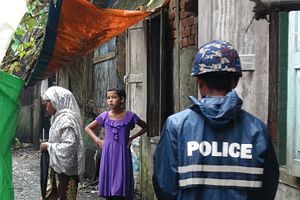As violence against the Rohingyas in Myanmar forces a mass exodus from Rakhine state, there is a rising concern about the migrant flows into South Asian countries. Rohingya refugees are fleeing to Sri Lanka, India, Pakistan, and Bangladesh, leading to an increase in anti-Muslim and anti-refugee sentiments in the region. If regional actors don’t create comprehensive policies for Rohingya refugees and don’t pressure Myanmar to stop the violence, it will result in greater instability in the subcontinent.
In order to prevent this, South Asian countries must provide more realistic and comprehensive solutions to the Rohingya migration crisis. Almost 500,000 Rohingya refugees have fled to Bangladesh and over 40,000 to India and Pakistan respectively. There are several challenges these over-populated countries must consider when creating a strategy to incorporate refugees. For example, Bangladesh has recently announced that it will build a new refugee camp to accommodate the influx and the ruling government has expressed sympathy to the migrants.
However, this approach fails to consider the cascading effects on neighboring India, who has been experiencing unlawful migration from Bangladeshi citizens due to the increased competition over social services and jobs. A better strategy would be for India and Bangladesh to collaborate on the migration issue, whether by offering temporary or permanent resettlement, so that social services and job security are attainable for refugees and citizens alike.
Pakistan has been proactive in speaking out against Myanmar regarding the Rohingya refugee crisis; however, the country is failing to support its existing Rohingya population. Rohingyas in Pakistan face severe discrimination and experience barriers to social services in Pakistan. For example, they are not allowed to receive Pakistani National Identity Cards, barring them from proper jobs, medical, and social services. Additionally, most Rohingyas live in poor slum conditions with little intention from the Pakistani government to improve their conditions. Without first re-evaluating current policies aimed at the Rohingyas, Pakistan has little credibility when criticizing neighboring countries about implementing better policies.
As migration increases in these South Asian countries, communal violence is increasing. When envisioning new policies for the Rohingya, South Asian countries must pursue public awareness campaigns to promote greater inclusion of these populations. Communal violence is already widespread in Bangladesh, India, Pakistan, and Sri Lanka based on ethnic and religious lines, but the risk is heightened with the influx of Rohingyas. Anti-Muslim sentiments promoted by India’s Hindutva-aligned ruling government have the potential to increase, especially with the upcoming national election in 2019. Pakistan, already experiencing sectarian violence despite being a country for all Muslims, is pushing back against the integration of the Rohingya as ethnic divides still dominate Pakistani society.
Even Sri Lanka, a country that recently ended a bloody civil war based on ethnic divides, has seen a rise in communal violence as a result of the Rohingya migrants. Last month, a mob of Buddhist monks stormed into a UNHCR safehouse for Rohingya Muslims and attacked 31 refugees, including 17 children. Sri Lanka is already attempting to go through a reconciliation process from decades long civil war and must take greater steps to curb the rise of Buddhist extremism as it can be damaging to the overall peace of the country. Regional governments must be willing to promote greater inclusivity of the Rohingya refugee population with the existing populations to ensure peace and stability within the region.
South Asian countries must also adhere to international conventions regarding refugees when addressing the migration crisis. India, the clear regional superpower in South Asia, is a signatory to several international conventions on human rights, including the recent New York Declaration for Refugees and Migrants, which recognizes refugee asylum rights. If India does not have space to house the refugees, the least it can do is engage the government of Myanmar to promptly stop the violence. Similarly, other South Asian countries who have adopted the New York Declaration must follow suit and promote the rights of Rohingya and other refugee communities as they seek asylum in the subcontinent.
In South Asia, countries often function within a domino effect—when one country does something, its impacts are felt on surrounding countries. The Rohingya crisis can either be a detriment to the region or unite them. The region needs to take a strong role in supporting the Rohingya, whether through providing a more concrete approach to refugee settlement or through international political engagement with the government in Myanmar. In the end, meaningful action could help show the strength of the subcontinent in confronting this crisis and future problems in the region.
Angel Sharma is the South Asia Fellow at Young Professionals in Foreign Policy (YPFP). She works in the international development sector focusing on the rule of law and human rights at an international NGO. Angel received her MA in International Security from American University. The views and opinions expressed in this article are the author’s own and do not necessarily reflect the views of any of the organizations with which the author is affiliated.

































